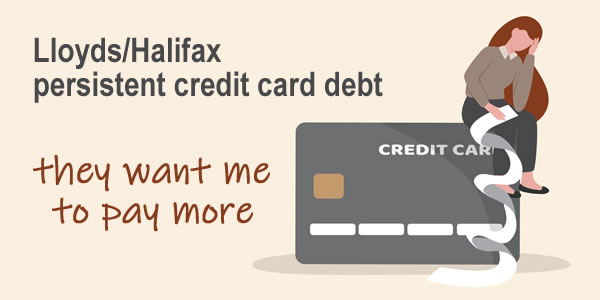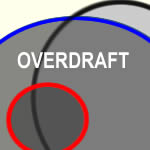
Mrs X was happy when Halifax told her that they were cutting the interest rate on her credit card – down from 32% to 15%.
But just two months later, Halifax sent another letter saying she must make higher “Recommended Payments” or she can’t use the card any more.
She says:
Halifax want me to pay at least £102 a month, about £20 a month more than the minimum. They say this will clear the balance in four years and they will stop the credit card if I don’t.
I have always been paying the minimum payments since I got the card about three years ago. Should pay more? Or should I let the card be stopped – I think I can manage without it.
These actions are part of Halifax’s Persistent Credit Card Debt handling. Which all banks and credit cards have to do, but most people have never heard of it.
So let’s look at the rules about this and how Halifax is implementing them. Then at what your options may be if you get this sort of letter from your credit card lender.
Contents
Persistent Credit Card Debt
The definition of “in persistent debt” is when the amount you have paid in interest and charges is bigger than the amount of borrowed money that you have paid back over a period of 18 months.
For example, if you have paid £100 to a card and £60 of that went to pay interest and only £40 to reduce your debt, then if that happens for 18 months the regulator saying this is “persistent debt”.
This will often happen if you only pay the minimum amount each month. The rules were introduced because only paying the minimum can take an extremely long time to repay a card balance, sometimes over 20 years!
The rules about what a lender has to do
A lender has to send a warning letter when someone has been in persistent card debt for 18 months. And then another letter if the customer is still in persistant credit card debt 9 months l;ater, so they have been in persistent credit card debt for 27 months. This has to suggest the customer should pay more.
If you are still in persistent debt after 36 months, the lender then has to take action, not just send a vague letter.
The FCA says:
After 36 months of a customer being in persistent debt … the firm must offer the customer options to help repay the debt more quickly.
If customers do not respond to the PD36 communication within a reasonable period set by the firm, the card must be suspended.
How Halifax, Lloyds & Bank of Scotland are implementing persistent debt rules
Halifax’s website has this page on persistent debt. The two other banks in the same group, Lloyds and Bank of Scotland, use similar wording.
Mrs X’s letters are an example of how this works in practice. She doesn’t remember receiving the earlier 18-month or 27-month letters, but thinks she may have ignored them. The two letters she has now received are the “36 month” letters.
Halifax and other banks have to offer a customer in persistent debt options at this point. They couldn’t choose to ignore it.
The first 36 month letter
The letter in November started with:
As your account is in persistent debt, we’ve lowered the interest rates on your credit card to make your repayments easier.
It then explained that unless she started to pay more, Halifax would write to her again in January suggesting a larger payment. And that it may stop her card if she can’t pay more after January.
Mrs X continued to pay the minimum.
The second letter
The letter she got in January was headed:

It started:
Thank you for the repayments you’ve made over the last 18 months. All payments help but they haven’t been enough to get your account of persistent debt, so we’ve added a new Recommended Payment Amount to your statement.
Then it explained:
You’ll need to have made a Recommended Payment by the due date in your February Statement so you can keep using the card.
Overall I think Halifax did a good job of explaining the situation and what was going to happen clearly.
And they have made it easier to pay this recommended amount by letting you set up a direct debit for it.
The choice – pay more or have the card stopped
Mrs X says she can afford to pay the larger recommended amount. She also hasn’t used the card for several months and doesn’t think she needs it any more.
That makes her choice simple. By paying the new Recommended Amount, not the minimum, she will clear the card much quicker – about 4 years rather than 15+ years – and pay a lot less interest.
But if you can’t afford to pay more, what are your options?
Halifax says if you can’t pay the Recommended Amount, it will stop you from using the card, so at least your debt will keep dropping if you are paying the minimum.
If you are using the card to pay for essentialssuch as groceries and petrol so you don’t think you can manage with not using the card, Halifax says you should phone them. It isn’t clear what it will do in this situation.
It’s OK to use a card to pay for essentials occasionally. But using credit every month for essentials can’t carry on every month as your debts just increase.
Debt solutions
If you have large debt problems or arrears with bills, you should look at your other debt choices.
One option is to make payment arrangements with Halifax and other non-priority debts. That would let you pay less each month and get interest frozen. It harms your credit record but it is a simple, practical way to clear debts that otherwise you can’t manage.
If you don’t want to phone your creditors to do this, StepChange can set up a Debt Management Plan for you. That’s like a series of payment arrangements but StepChange do all the talking to your creditors and you just pay them one payment a month. It all goes to your creditors, there aren’t any fees, and interest is almost always stopped.
Not sure? Talking to a debt adviser can help you make this decision. Phone National Debtline on 0808 808 4000 and they can talk you through your options and the pros and cons of each.
But have you been lent too much by the credit card?
Getting this sort of persistent debt letter may make you think about the level of your credit card debt. Should the bank really have set your limit that high?
If a lender gave you a limit that is unmanageable, or they have increased a limit too high when you were only making minimum payments, read Ask for a refund for card unaffordable lending and think if you should make a claim.
It’s simple to make a claim and it doesn’t affect your credit record. You can do this whether you decide to make the new recommended payments to the card or have the card stopped. Or if you decide to make a payment arrangement or set up a DMP. This is an extra choice that will help you to clear the debt faster if you win the claim.



Kathleen Mason says
On the unaffordable debt issue.
I found to my cost there is a time limit for claiming.
Sara (Debt Camel) says
There are some time limits. The Ombudsman can look at problems that have happened in the last six year, or longer ago if you have only become aware you had a reason to complain in the last three years. For old cases it can also be hard to find much evidence about what happened.
But many people getting these persistent debt letters will have opened an account or had a credit limit increase within the last six year, so there is no question that they are within time.
Juan says
Thank you Sara for the article.
In response to Mrs X, if you can, pay even more than the recommended payments, this will help you clear your debt even faster and you will pay less interest too. About 10 years ago I was unable to pay my credit cards so I contacted Stepchange and had the shock of my life when they explained to me that if I continued paying the minimum amount on each of my debts, it would take me 52 years to pay my debts provided I didn’t accrue a single penny of further debt… I started a DMP straight away and my financial situation is much better now. I use credit cards to get cheaper flights and pay my balance in full every month, therefore I do not pay any interest. I really wish I had researched more about debt before getting credit but learn my lesson after all.